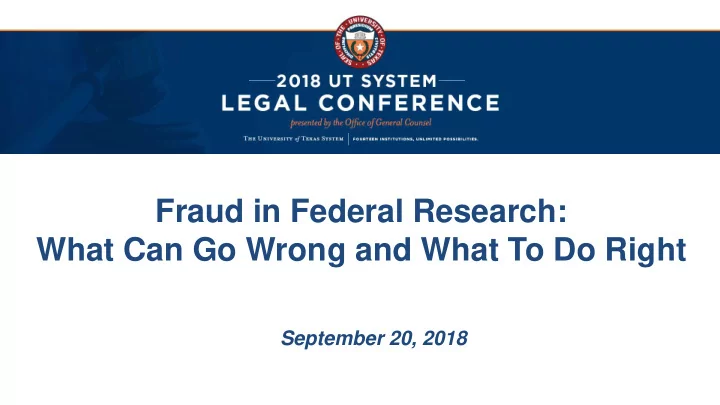

Fraud in Federal Research: What Can Go Wrong and What To Do Right September 20, 2018
Federal Grants and Federal Grant Fraud: The Players 2
Sources of Federal Grant Funds* Department of Health and Human Services (HHS) National Science Foundation (NSF) Department of Defense (DOD) Department of Energy (DOE) Department of Transportation (DOT) Office of Naval Research (ONR) *Non-exhaustive list 3
Office of Inspector General (OIG) Most federal agencies have an independent OIG Dual reporting obligation: Agency head, Congress OIG missions: Prevent and detect waste, fraud, and abuse Promote economy, effectiveness, efficiency Keep agency head and Congress fully and currently informed OIG Tools To Meet Mission Goals: Investigations Audits 4
United States Attorney’s Office (USAO) Attorneys tasked with the prosecution of criminal cases brought by the Federal Government and the prosecution and defense of civil cases in which the United States is a party One of the core priorities of the USAO is to protect Americans from financial fraud that devastates consumers, siphons taxpayer dollars, weakens our markets, and impedes our ongoing economic recovery 5
Universities YOU! 6
If you learn nothing else today, learn … Proper documentation and implementation of compliance controls are key components to success in protecting the integrity of your university’s grant funds Know your regulations and requirements 7
The Nitty Gritty: Regulations 8
Uniform and Agency-Specific Regulations 2 C.F.R. 200 – Uniform Guidance Uniform administrative requirements, cost principles, and audit requirements across the government Note: Replaced OMB Circulars Selected provisions: Time and Effort (§200.430) Certifications (§200.415) Mandatory Disclosures (§200.113) Agency Specific Regulations 9
Uniform and Agency-Specific Regulations 2 C.F.R. 200 – Uniform Guidance Uniform administrative requirements, cost principles, and audit requirements across the government Note: Replaced OMB Circulars Selected provisions: Time and Effort (§200.430) Certifications (§200.415) Mandatory Disclosures (§200.113) Agency Specific Regulations 10
Uniform and Agency-Specific Regulations 2 C.F.R. 200 – Uniform Guidance Uniform administrative requirements, cost principles, and audit requirements across the government Note: Replaced OMB Circulars Selected provisions: Time and Effort (§200.430) Certifications (§200.415) Mandatory Disclosures (§200.113) Agency Specific Regulations 11
Research Misconduct 45 CFR § 689 “Research misconduct means fabrication, falsification, or plagiarism in proposing or performing research funded by NSF, reviewing research proposals submitted to NSF, or in reporting research results funded by NSF.” For an NSF finding of RM the preponderance of the evidence must support: The act (e.g., plagiarism) committed by the subject; and The subject’s intent in doing the act was at least reckless; and The act was a significant departure from accepted practices. 12
Research Misconduct - Intent 13
What’s the Quality of Your RM Policy? Current Is it > 10 yrs old and never been used Updates?? (post investigation) How do you handle admissions of guilt? How do policies link with other policies Consistency with Academic Misconduct policy General vs Agency Specific GC involved in process Community knowledge/adherence Readily available and understood at all levels 14
Compliance is Key: The Government’s View and Tools 15
In a nutshell, if you don’t comply with the regulations, you might end up under investigation. 16
The Investigation 17
How Do Investigations Begin? Reactive Investigations Allegations from: Program Officers & Other Staff Colleagues, Students, Post-Docs Ex-spouses/Ex-partners/Disgruntled Employees University Administrators Anonymous Tips Audit referrals Proactive Investigations Facilities Program Income Participant Support Plagiarism Human Subjects 18
How Do Investigations Reach DOJ? Agency referrals From an investigation From a self-disclosure From hotline complaints False Claims Act lawsuits ( qui tam matters ) filed by whistleblower (relator) Arm of the State U.S. ex rel. Doughty v. Or Health & Scis. Univ , No. 3:13-cv-01306-BR, 2017 WL 1364208, at *5 (D. Or. Apr. 11, 2017) (on appeal) 19
Consequences 20
Consequences: Suspension and Debarment Government-wide suspension and debarment To protect federal funds from those who are not “presently responsible” Consequences: Central System for Award Management (SAM.gov) listing Applies to all prospective grants and contracts over $25,000 If one agency imposes, barred from ALL federal funds 21
Consequences: Criminal Jail and/or probation Fines Restitution 22
Consequences: Civil $$$ - Treble damages plus penalties Compliance plans 23
Common Defenses & Justifications (normally ineffective) 24
BUT … … we did the work! (common, but generally not valid) … we didn’t have time to read all of your rules! … we haven’t put together a time and effort policy yet! … we had no idea our records were such a mess. ... we don’t provide any formal training about federal grants management – we have “on the job” training. And that’s only a few of them! 25
Case Studies: Real Life Examples 26
Criminal Case Study: Duplicate Funding and Outside Activities 27
Criminal Case Study: Outside Company and Student Stipend Kickbacks 28
Criminal Case Study: Embezzlement by University Accountant 29
Civil Case Study: Lack of Adequate Documentation Involving Personal Expenses and Advance Payments 30
Criminal Case Study: Professor Purchases Unauthorized Equipment 31
Civil Case Study: Time Report Certification and Salary Draw Errors Lead to FCA Settlement 32
Administrative Case Study: Data Falsification and Plagiarism 33
Civil Case Study: Falsified Institutional Review Board Approvals 34
Civil and Criminal Case Study: Falsified Documents During Audit Lead to FCA Settlement 35
Avoiding These Issues (and us!) 36
How to Avoid Trouble – What are our Key Take Aways? 1. Read and know the applicable grant conditions, rules and regulations when receiving federal grant funds: Provide and Document (Mandatory) Training 2. Maintain (during, not after the fact) adequate documentation to support all expenditures, including cost share 3. Ensure your financial reporting matches your financial records 4. Do not expend award funds post-expiration or for purposes unrelated to the award 5. Do not provide inaccurate information or false certifications to Grantee institution or Federal Agency 37
QUESTIONS? 38
Recommend
More recommend